asbe/E+ via Getty Images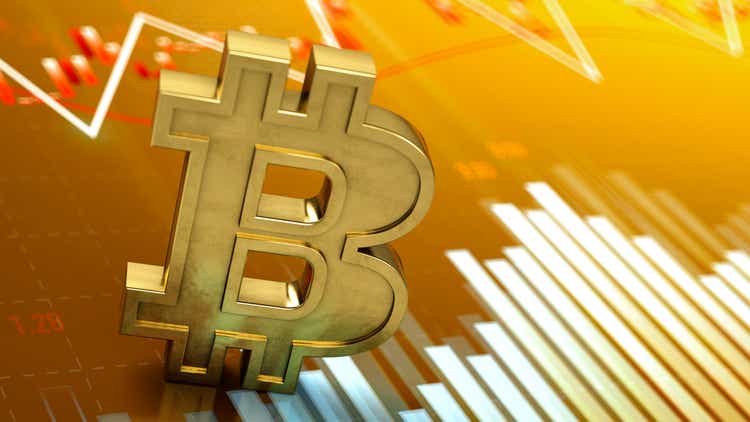
The surge you see in Galaxy Digital’s (OTCPK:BRPHF) share price in the third week of March with respect to Bitcoin (BTC-USD) has translated into a one-month outperformance of 24.5% (34.23-9.72). It occurred on March 21, the day Goldman Sachs (GS) performed a crypto derivatives trade with the help of the trading company whose services cover digital assets.
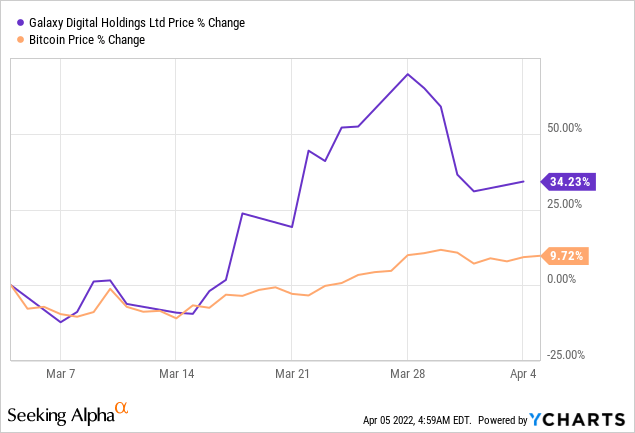
My objective with this thesis is to further explore Galaxy Digital’s (“GD”) partnership with Wall Street’s banks in light of the institutional adoption of bitcoin, which is about the investments done by rich individuals and corporations, in contrast to the small investors and hodlers who have mostly bought the cryptocurrency up to now.
Partnerships with Wall Street banks
The big Wall Street banks are being called upon to provide more crypto services as a result of demand from their customers. For this purpose, not all investors are ready to buy Bitcoin or Ethereum (ETH-USD) directly on exchanges like Binance (BNB-USD) and hold crypto-wallets. Instead, they want to own crypto as part of diversified portfolios managed by experienced fund managers whom they already trust.
Scanning the media for other names, I came across JPMorgan (JPM), Morgan Stanley (MS), and Deutsche Bank (DB). These have announced the placement of customers’ cash into bitcoin funds and arranged for the provision of custody services whereby they hold and become responsible for the crypto investments on behalf of clients, which, by the way, are private clients, not just any retail banking customer. The information is summarized in the table below.
| Action | Bank Name and date | |
| 1 |
Placement of private bank clients in bitcoin fund launched with NYDIG, a crypto firm. |
JPMorgan, August 2021 |
| 2 | Providing access to three bitcoin funds with Galaxy Digital (2) and NYDIG (1). | Morgan Stanley, March 2021 |
| 3 | Launched the Deutsche Bank Digital Asset Custody prototype for wealth managers, family offices, corporates, and digital funds. | Deutsche Bank. 2021 |
Source: Compiled by Author
These U.S. megabanks have forged partnership structures with both GB and NYDIG in order to offer their clients access to Bitcoin and Ethereum through private funds which are both actively and passively managed.
For investors, NYDIG or New York Digital Investment Group had its application for listing shares of a spot bitcoin exchange-traded fund rejected by the SEC last month, with Global X, a well-known ETF issuer also suffering the same fate.
In this respect, regulations remain one of the principal causes of volatility for cryptos, which may sometimes be hard to understand especially given that the SEC approved the ProShares Bitcoin Strategy ETF (NYSEARCA:BITO) on October 19, 2021. The reason was that the latter is based on bitcoin futures contracts, forming part of the commodity asset class, and, as such regulated by the Commodity Futures Trading Commission (CFTC), not the SEC.
Driving institutional adoption amid volatility and high-inflation
As a U.S. government body, the SEC’s role is to provide regulatory oversight in the securities market, with the primary goal being to protect investors. Other mandates include maintaining fairness and efficiency in stock markets. Interestingly, the “Executive Order on Ensuring Responsible Development of Digital Assets” by the U.S. President appears like an appeal to federal agencies for acting more rapidly with regulatory oversight.
Despite clear guidelines and with inflationary pressures biting harder, bitcoin has seen wider adoption as evidenced by its outperforming (in pale blue) of the tech sector represented in the chart below by the Invesco QQQ Trust ETF (QQQ) in green. Now, when this outperformance is viewed in the context of inflation having surged by 5.23% during the last month alone, it gives credence to certain arguments that bitcoin may have started to behave as an inflation hedge.
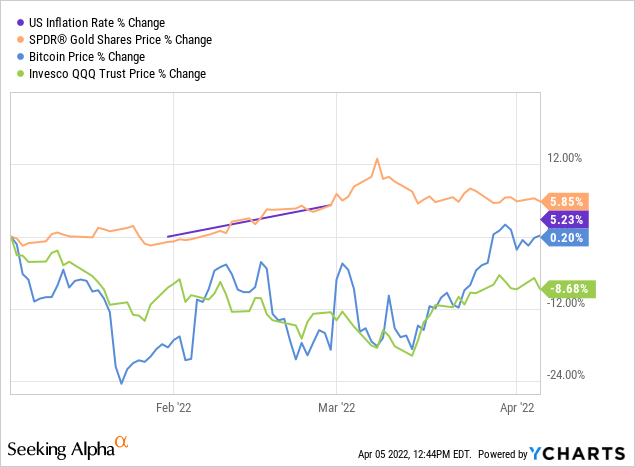
Moderating slightly, as shown in the orange chart above, the SPDR Gold ETF (GLD) with a 5.85% gain has delivered a better performance than bitcoin itself. Still, when looking at a three years period which is the type of long-term horizon prioritized by wealthy individuals and institutions, bitcoin becomes an attractive option as part of a diversified portfolio as it has outperformed both the precious metal and the stock market by at least 500%.
For this purpose, GD’s role to drive digital assets further into the global financial system should further be helped by the acquisition of BitGo, whose crypto products are viewed not only as being capital efficient but also makes sense from the trust and risk mitigation perspectives as the company focused earlier on to meet standards like the CryptoCurrency Security Standard (CCSS) and SOC2 (System and Organisation Controls) which are commonly used in the financial industry.
This focus on getting products to be compliant with more traditional finance amounts to self-regulation, a way to compensate for regulatory oversight. Thinking aloud, this may be precisely one of the reasons why GD has found an appeal among megabanks with their high-net-worth individuals willing to invest millions of dollars in cryptos.
Furthermore, with limited time to trade individual stocks as part of a brokerage account like you and me, these investors also tend to opt for a fund structure, like those proposed by GD, which in addition to fund management is also involved in other activities around the blockchain ecosystem as shown below.
Corporate website (www.galaxydigital.io)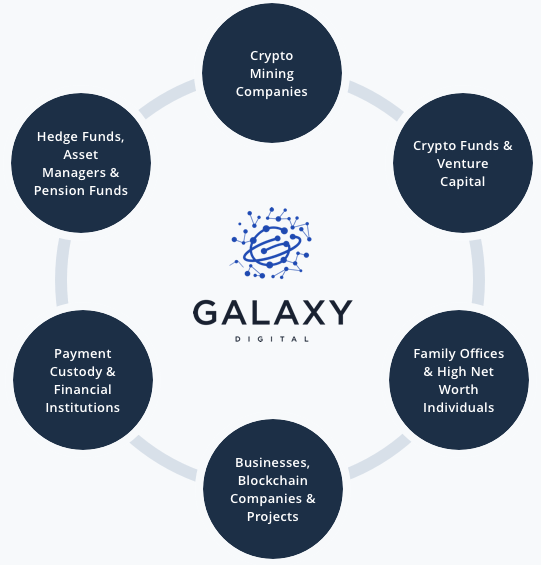
Assessing the performance of its digital assets funds, GD had strong inflows during Q4 which represented a sequential increase of 29% from Q3. Ultimately, these contributed to AUM (assets under management) reaching $2.9 billion at the end of 2021, representing a phenomenal 256% growth over 2020.
However, as of the earnings call date on March 31, this amount had contracted to $2.4 billion, caused by a reduction in the total crypto market cap over the same period. This reduction by $500 million just over a three months period again shows some of the volatility risks inherent in crypto-assets and calls for GD to be backed by strong finances.
The finances
Looking into the balance sheet, the company had $811 million in cash at the end of 2021, up from $138 million in 2020. This included $500 million in convertible debt raised for platform building purposes. The company also had $2.6 billion in equity.
Moreover, it earned $1.365 billion in 2021, with staff compensation eating away $114 million, or an increase of $80 million from 2020 driven mainly by headcount increasing three-fold. Equity compensation also increased by $59 million. G&A was up by $20 million due to higher technology and marketing expenses and there was also higher depreciation from mining equipment that the company leases to miners to produce cryptocurrency.
Income statement (investor.galaxydigital.io)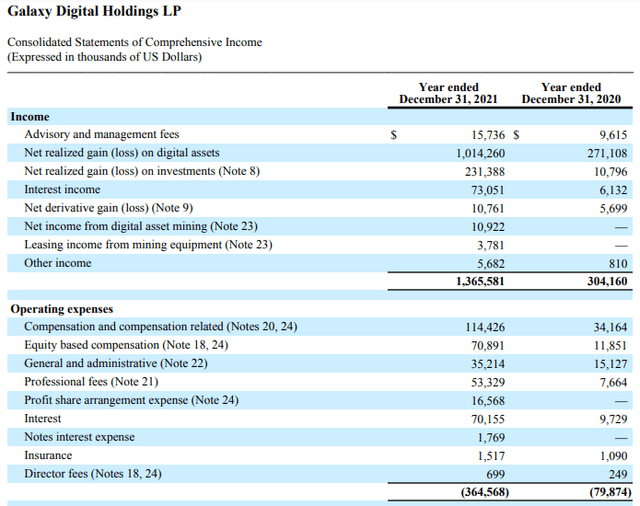
Costs were also incurred for an eventual U.S. listing in a domestication move away from the Cayman Islands where the company is currently registered. The planned listing on the Nasdaq will be under the “GLXY” ticker symbol.
Pursuing further, professional fees relating to the BitGo and Vision Hill acquisitions amounted to $53 million. Here, there has been a delay in integrating BitGo, initially scheduled till the end of 2021, and now postponed to 2022. With this postponement, some of the terms of the acquisition, namely the number of shares issued for the consideration of BitGo shareholders have also been amended. and the total value of the deal has decreased from $1.2 billion to $1.15 billion. This delay and change resulted in the stock being volatile and plunging by 13% at the end of March as shown in the introductory chart.
Valuations and key takeaways
As for valuations, considering an AUM of $2.9 billion, I obtain a value of $58 million using a rule of thumb that the valuations of asset managers are about 2% of AUM. However, this is a limited view of the business as it does not consider the other reportable segments like trading, investment banking, Principal investments, and mining businesses. These are shown below up till December 31, 2021, with assets exceeding liabilities.
Income statement (investor.galaxydigital.io)
To come up with a better estimate, I make an analogy with Silvergate Capital (SI), which similarly to GD’s platform, has an Exchange Network which provides bitcoin trading and collateralized loans services to crypto miners. Silvergate has a market cap of $4.73 billion and I assume the same for GD. Now, allocating a capitalization of $4.73 billion to Michael Novogratz’s company and dividing by 30,413,345, or the total number of shares outstanding as of December 31, I obtain a target share price of $154.
This appears to be a high target in view of the current price of $14-15, but the company is growing faster than Silvergate, is profitable and its net digital assets including stablecoins were $1.1 billion in 2021. Additionally, it pays to be Goldman’s partner, both in terms of trust and fame.
As an investment, GD is a rational choice for investors looking for exposure to the complete blockchain ecosystem, with actively managed funds investing in an array of different businesses ranging from digital coins to the metaverse including tokenized video games. These are made through 15 different passive and active fund products. Noteworthily, the executives’ intent is also to retain large limited partnerships interest GD’s Interactive and the Vision Hill funds.
Finally, despite all these positives, I would not advise investors to put new money on the stock, at least not till the integration of BitGo is completed and GD is publicly listed in the U.S. According to some sources, the SEC’s approval for the domestication process is taking longer than expected, and, in line with what I have already mentioned above, regulatory delays have proven to be volatile for crypto-related investments.


Be the first to comment